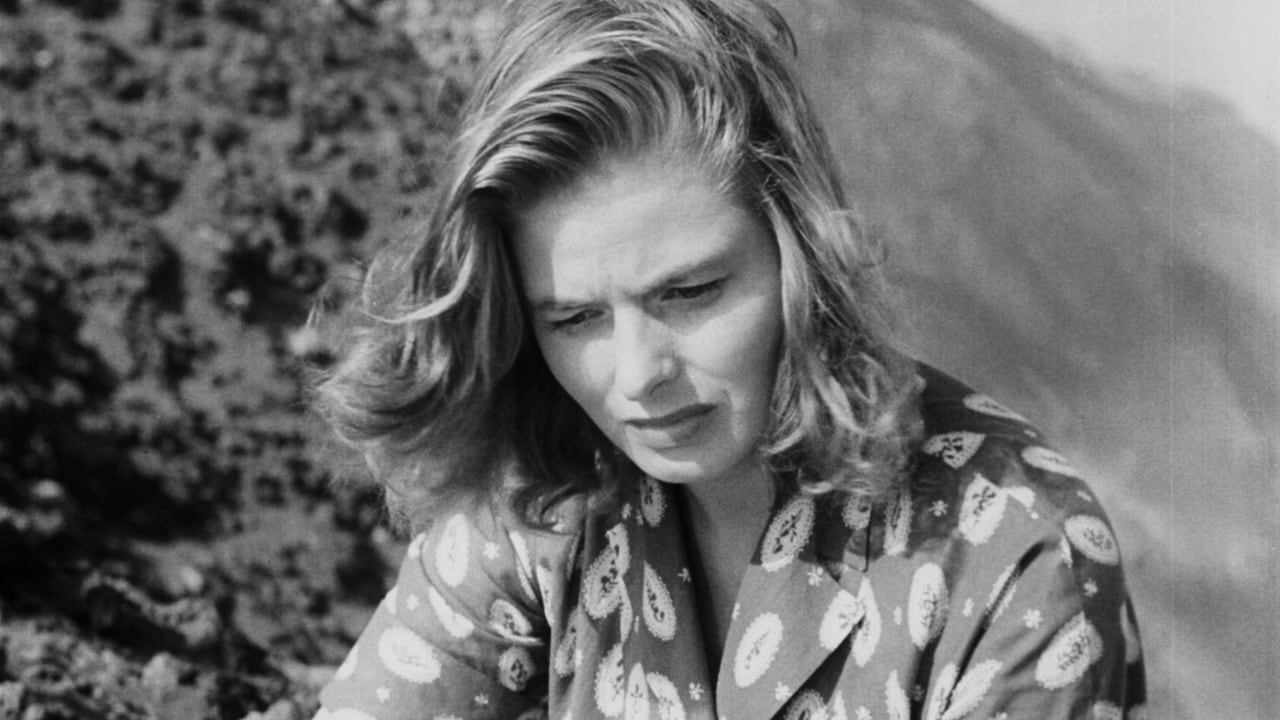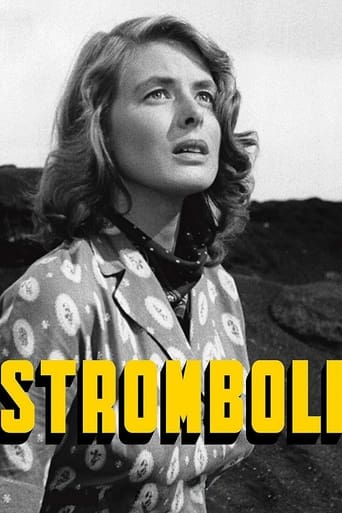

Great art only appears once and a while and sometimes it takes a long time to catch up to it. A lot has been made of Journey To Italy, the last of the films that Rossellini made with his muse, the penultimate Ingrid Bergman. They were breaking up at the time after a brief but brilliant affair which cost them both dearly. Bergman was condemned as a slut by the U.S. Senate, much like a woman's right to choose, but the wiser public welcomed the greatest film actress of all time back with open arms. Rossellini lost everything, both the love of his life and his career in one fell swoop. He was posthumously redeemed as the revered father of the European film wave which spread from Italy, to France, England, and finally Germany in the 1970's. Curiously "Journey" is thought of by film analysts as the first "modern" film. As modernity began in the 15th century and ended one morning in Hiroshima on August 6, 1945, I think what these "art historians" are trying to say is that "Journey" is the first Post Modern film showing clear tendencies of early Post Modern cinema. Perhaps. But it is the film that Bergman and Rossellini made at the apex of their love, Stromboli, which is truly a masterpiece for the ages. Maybe the first Post-Modern masterpiece as Ikiru was made four years later. Sunset Boulevard would have to be up there too. But Stromboli, as John Howard Lawson says "speaks with tongues of fire" and no one had a hotter one than Ingrid Bergman. I find it impossible to believe that Kobyashi, Igmar Bergman, and the entire French film wave were not under its spell, consciously or not. Like all the great masterpieces every important contemporary issue is touched on, the relation of homo sapiens to environment, alienation and "personal displacement", the horrors of patriarchal madness, our brutal treatment of animals, romance vs. reality, fate vs. free will, the lost connection with the spiritual world of our forebears not least. But what makes Stromboli the transcendent work of art that it is is its unrelenting dramatization of our inability to escape the labyrinthine ways of our own minds and are eventually called to pay the price for our unexpected creations however misbegotten. I must confess that Rossellini was never one of my favorite directors. I loathe many of his "history" films, and boring he can be. But with Stromboli, he bangs the cosmic gong. His direction is nothing short of magnificent, and the tension (yes) is grueling right up until the final ontological resolution, which is somewhat ambiguous, one of the most difficult of feats in all film-making to pull off successfully. Today, few have ever heard of Stromboli, never mind seen it. A deeply felt, powerhouse film of fantastic b&w imagery and some of the greatest acting you will ever see.
... View MoreStromboli is a movie that comes from the post World War II neo-realist school. It is not for a modern mass audience, but if you like movies like The Bicycle Thief or Wild Strawberries, this movie is worth watching. I found Ingrid Bergman's performance superb as the well educated and literate wife of an Italian fisherman, rescued from a refugee camp. Once this refined young woman finds herself on a lonely island off the southern coast of Italy with nothing in common with the local people, she is at her wit's end. She will do anything to get away. The young woman tries to befriend people but every time she does, she seems to run afoul of the local customs. She pays a visit to a local seamstress who is shunned and this causes her to be guilty by association. When she decorates her home, her husband is upset by the removal of religious objects and old family photos. Even when going to church, she is stared at by everyone in the congregation. She finds some comfort in the priest who seems to understand her predicament and counsels her to save money for a time in the future when they can get away to a place that is more hospitable for them. This is not much consolation for her. At one point, the whole village is driven off the island by the eruption of a volcano that stands only a short distance away. The filming of this natural disaster is extremely effective and viewers feel they are in the midst of the eruption. For her, it is another reason to abandon the island forever. We feel that in some ways she has grown into a more mature person as a result of her trials; however, the gulf between her comfort zone and life on the island is too wide. The ending is neither hopeful nor despairing, and we can only imagine what might happen.
... View MoreWhen this first came to the USA, it had already garnered quite a bit of publicity because of Bergman's liaison with Rosellini. But the initial reviews were very bad. Those reviews were correct.Seen today, the movie is a mush-mash. The voice of performers change in mid sentence. Continuity is amateurish. Bergman, the lead character seems to change her personality from scene to scene. Using real people as secondary characters may have seemed like a good gimmick when they were speaking a language not understandable to the audience, but when you hear them fumble with English and hear the risible dubbing, it is a major distraction,.
... View MoreThis is one to cherish, spiritually rich but not mawkish—an ascetic film. It is of course an erudite treatise on Catholic guilt, better than any inner demons Bergman exorcised on celluloid. What Bergman strived to hold on to, Rossellini can let go. But more, having offered us a broken soul, it unifies back into a single vision of the common source that encompasses every spiritual utterance.It always comes back to the same; the same burning questions about meaning and plan in a cruel, perishable world, the same terror that we cannot effect any control upon it or make ourselves last. And, having experienced the anxieties of being and coming to pass and ineffability of attaining happiness, the path that leads out of them again. Every spiritual vision is a signpost on this path.Rossellini's paradigm is simple enough; about a brazen, obstinate woman coming to live in an inscrutable, hopeless landscape, and about the life-renewing sacrifice that brings atonement. It could have been a simple story of religious lore, like Job. But notice how rich the different strands woven into it.The woman filled with desires to please, planning for happiness. She wants to leave for Argentina or America, the paradise on earth where dreams are unequivocally fulfilled. She will use and abuse whatever she can to reach that imaginary place, which is only a childhood regression into the place where our every whim is to be pleased.And by contrast, a pitiless land; poignantly as a volcanic island, where life is constantly destroyed and created anew, and the humble, hardworking peoples who have made their peace with the toll of suffering. Now it's her turn to learn to let go pride and ego and abide by the common mandate.The fishing scene is important in this aspect; as the ritual that brings men together into a single entity, working for the common goal that prolongs life. We assume her pov for this, as tuna fish are harpooned from the sea and violently tossed inside boats. She's aghast by so much pain, but now she knows how the easy money she has enjoyed all her life is earned.More portents; the kids she encounters in her wanderings om sunbaked rock. The first kid allows her to realize the tears on her own face, the group of kids fishing clams lead her to the forbidden passion. The temptation to escape into a selfish world. It is all about the inner journey to extinguish the flames of ego that singe the soul. Properly reflected as an outer journey that will take her through the peak of the volcano, the summit where god is revealed.Once there we are offered the communion with god, as usual an internal monologue. The pride that had prevented her from seeking pity and solace now dissolved, she is free to return to the world with life-renewing wisdom and understanding. New life now grows inside of her, quite literally.Rossellini shows how our effort to master the world brings only suffering. But if we allow ourselves to be one with and embody the mastered world?Subsequent filmmakers would make more sophisticated films on the same ideas (Malick, most recently), but this is the clear picture, an aesthetic so transparent and filled with a restraint and ardor that is only possible through a deepseated love for what cinema can do.
... View More